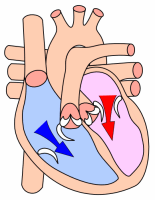Diastole facts for kids
Diastole is a super important part of your heartbeat! It's the moment when your heart relaxes and fills up with blood. Think of it like a sponge soaking up water. After your heart squeezes (which is called systole), it needs to relax to get ready for the next squeeze. The word diastole comes from an old Greek word that means "expanding" or "opening."
Contents
What Happens Inside Your Heart During Diastole?
Your heart has four main rooms, or "chambers." The two upper chambers are called the atria, and the two lower chambers are called the ventricles. Diastole happens in both parts of your heart.
- Ventricular diastole is when the two lower chambers (the ventricles) relax. This allows them to fill up with blood from the atria.
- Atrial diastole is when the two upper chambers (the atria) relax. This lets them fill up with blood coming from your body and lungs.
During ventricular diastole, the pressure inside your ventricles drops. When the pressure in the left ventricle becomes lower than the pressure in the left atrium, a special door called the mitral valve opens. This lets blood flow from the atrium into the ventricle.
Diastolic Blood Pressure Explained
When doctors measure your blood pressure, they give you two numbers, like 120/80. The second number, 80 in this example, is your diastolic pressure.
Diastolic pressure is the lowest pressure in your arteries during each heartbeat. It happens when your heart muscle is relaxing and filling with blood. The first number, called systolic pressure, is the highest pressure. This happens when your heart squeezes to push blood out.
So, when you see 120/80, it means your blood pressure is 120 when your heart squeezes, and 80 when it relaxes.
Related Heart Topics
- Systole (the heart's squeeze)
- Understanding blood pressure
- How the heart works (Wiggers diagram)
See also
 In Spanish: Diástole para niños
In Spanish: Diástole para niños
 | Sharif Bey |
 | Hale Woodruff |
 | Richmond Barthé |
 | Purvis Young |


